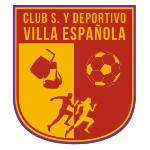| Coach | NA |
| Venue | Estadio Obdulio Varela |
Villa Espanola predictions
Predictions for Villa Espanola: See upcoming and historic predictions for Villa Espanola below.
Disclaimer: Past performance does not guarantee future results. Betting involves risk; only wager what you can afford to lose. Always gamble responsibly.
Villa Espanola latest results
| 21/09 | 1 - 1 |
Villa Espanola latest transfers
| Date | Player | From | To | Price |
|---|---|---|---|---|
| 2021-04-07 | Santiago Amorín Barrientos | Liverpool Montevideo | Villa Espanola | € Free |
| 2020-08-13 | E. Castillo | Villa Espanola | La Luz | € Free |
| 2018-02-23 | N. Gómez | Villa Espanola | Fuerza Amarilla | € Free |
| 2018-01-01 | Richard Luis Mercado Corozo | Villa Espanola | LDU Portoviejo | € Free |
| 2017-07-24 | I. Barrios | Villa Espanola | Atletico Torque | € Free |
| 2017-02-07 | M. Correa | Villa Espanola | Atletico Torque | € Free |
| 2016-07-03 | I. Barrios | Plaza Colonia | Villa Espanola | € Free |
| 2016-07-01 | C. Techera | Wanderers | Villa Espanola | € Free |
| 2016-03-03 | R. César | Club Nacional | Villa Espanola | € Free |
| 2015-01-29 | Álex Maximiliano Silva Garrel | Parrillas One | Villa Espanola | Free € |
Segunda División standings
| Rank | Team | MP | W | D | L | GF | GA | GD | Pts |
|---|---|---|---|---|---|---|---|---|---|
| 1 |
 Albion FC
Albion FC
|
0 | 0 | 0 | 0 | 0 | 0 | 0 | 0 |
| 2 |
 Atenas
Atenas
|
0 | 0 | 0 | 0 | 0 | 0 | 0 | 0 |
| 3 |
 Cerrito
Cerrito
|
0 | 0 | 0 | 0 | 0 | 0 | 0 | 0 |
| 4 |
 Atletico Torque
Atletico Torque
|
0 | 0 | 0 | 0 | 0 | 0 | 0 | 0 |
| 5 |
 Colón
Colón
|
0 | 0 | 0 | 0 | 0 | 0 | 0 | 0 |
| 6 |
 Cooper
Cooper
|
0 | 0 | 0 | 0 | 0 | 0 | 0 | 0 |
| 7 |
 Juventud
Juventud
|
0 | 0 | 0 | 0 | 0 | 0 | 0 | 0 |
| 8 |
 La Luz
La Luz
|
0 | 0 | 0 | 0 | 0 | 0 | 0 | 0 |
| 9 |
 Oriental
Oriental
|
0 | 0 | 0 | 0 | 0 | 0 | 0 | 0 |
| 10 |
 Plaza Colonia
Plaza Colonia
|
0 | 0 | 0 | 0 | 0 | 0 | 0 | 0 |
| 11 |
 Rentistas
Rentistas
|
0 | 0 | 0 | 0 | 0 | 0 | 0 | 0 |
| 12 |
 SUD America
SUD America
|
0 | 0 | 0 | 0 | 0 | 0 | 0 | 0 |
| 13 |
 Tacuarembo
Tacuarembo
|
0 | 0 | 0 | 0 | 0 | 0 | 0 | 0 |
| 14 |
 Uruguay Montevideo
Uruguay Montevideo
|
0 | 0 | 0 | 0 | 0 | 0 | 0 | 0 |
About Villa Espanola
Club Atlético Villa Española, commonly known as Villa Española, is a professional football club based in Montevideo, Uruguay. Founded on November 18, 1940, the club has a rich history and plays an integral role in Uruguay's football landscape.
Villa Española's journey began in the neighborhood of Ituzaingó, where a group of friends decided to form a football team. The club's name was inspired by the Spanish immigrants who lived in the area. Over the years, Villa Española has become a symbol of community spirit and local pride, fostering a strong sense of identity among its supporters.
The club's colors are yellow and red, a nod to the Spanish flag. Their home ground is Estadio Obdulio Varela, named after the legendary Uruguayan footballer who led the national team to victory in the 1950 World Cup. The stadium, with a capacity of 10,000 spectators, is a testament to the club's local significance and its ambitions for the future.
Villa Española has spent most of its history in the second tier of Uruguayan football, the Segunda División. However, the club has had several stints in the Primera División, the top flight of Uruguayan football. Their most recent promotion to the Primera División came in 2015, after a successful campaign in the Segunda División.
Despite not having a trophy-laden history, Villa Española has produced several notable players who have gone on to achieve success both domestically and internationally. The club has a reputation for nurturing young talent, providing a platform for aspiring footballers to showcase their skills.
Villa Española's matches are characterized by passionate support from their fans, known as the "Villeros". The club's ethos is rooted in community values, with a focus on unity, perseverance, and sporting excellence. Despite the ups and downs, the club's unwavering spirit and commitment to its community have remained constant.
In recent years, Villa Española has made efforts to modernize its operations and infrastructure. The club has invested in youth development and training facilities, with the aim of producing homegrown talent capable of competing at the highest level. The club's vision is to establish itself as a stable and competitive force in Uruguayan football, while staying true to its community roots.
In conclusion, Club Atlético Villa Española is more than just a football club. It is a symbol of community spirit, a beacon of hope, and a source of pride for its supporters. Despite the challenges, Villa Española continues to strive for success, embodying the spirit of perseverance and resilience that defines Uruguayan football.
















